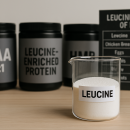Whey protein supplements need no introduction in the world of dietary supplements.
Whey protein supplements contain different types of whey protein raw materials:
- Whey protein concentrates (WPCs)
- Whey protein isolates (WPI)
- Whey Protein hydrolysates
Products can be based on any of these protein sources and often you will see combinations of 2 or more sources.
However, there has been some controversy surrounding the safety and quality of whey protein concentrate, with some critics claiming that it is an inferior protein source compared to whey protein isolate.
In this article, we will explore why whey protein concentrate is not bad at all and why it can be a safe and effective dietary supplement for many people. We will also look at situations where a whey protein isolate is recommended.
What is Whey Protein Concentrate?
Whey protein concentrate is a type of protein that is derived from whey, the liquid that separates from milk during cheese or casein production.
Whey protein concentrate is made by removing some of the non-protein components from whey, such as lactose (a carbohydrate) and fats, through a filtration process.
The liquid is then dried and the resulting powder typically contains about 75% protein, along with some carbohydrates, fats, and other nutrients.

Common criticisms on whey protein concentrate and why these aren’t well founded.
There are several reasons why some people view whey protein concentrate as bad or inferior to other types of protein powders.
Protein Quantity and Quality
Whey concentrate is often considered a lower-quality protein source compared to whey protein isolate, which is a more purified form of whey protein.
The Whey protein isolates raw material typically contains more than 90% protein (Figure 1). This is due to the extra purification during manufacturing. Supplement companies then add additives to this raw material (e.g. flavours, sweeteners, etc.) which lowers the protein percentage. WPI-based products generally contain about 80-85% protein.

Nutritional Information of a Whey Protein Isolate Raw Material
On the other hand, the Whey protein concentrates raw material contains about 75% protein (Figure 3). After adding additives to the raw material the protein level is lowered to about 68-70%.

This difference in protein content has led some people to believe that whey protein concentrate is an inferior protein source that is less effective at promoting muscle growth and recovery.
The truth is that the protein quality is the same.
Higher sugar and fat content
Some people view whey protein concentrate-based products as bad as it contains some carbohydrates and fats. This is all dependent on what the supplement brand does with the raw material. If they start with a good quality whey concentrate raw material like WPC80 and add little “fluff” to it, then the resulting product will be very good.
If they do shady stuff with it, e.g. adding whey powder (high lactose), carbs like Maltodextrin or milk powder. Then the resulting product will contain excess carbs and fats. The protein percentage will also be low.
Speed of digestion
Yes, the speed of digestion may be different between whey isolate and concentrate. Whey isolate is typically considered to be a faster-digesting protein than whey concentrate.
This is because whey isolate undergoes further processing to remove more of the fats. Fats tend to slow down the rate of gastric emptying.
This means that whey isolate may be absorbed more quickly by the body, leading to a faster increase in amino acid levels in the bloodstream.
However, it’s worth noting that the difference in speed of digestion between whey isolate and concentrate may not be significant enough to make a noticeable difference in terms of muscle growth or recovery.
When to choose a Whey Isolate
Whey isolate is favored in specific cases, such as by athletes and bodybuilders aiming to increase protein intake while minimizing carbohydrate, fat, and lactose consumption. It is also suitable for individuals with lactose intolerance due to its low lactose content.
Bottom line
Whey protein concentrate is a good protein source as long as the best-in-class form is used (WPC80) and no fillers are added to it.

To view my Professional Profile on LinkedIn: please click here
To see my latest product creations: www.bioteenhealth.com
To view my Scientific Publications on PubMed: please click here
To get in touch, please write to: info@supplementscientist.com
Follow supplementscientist.com on Facebook: please click here
Disclaimers
Medical: The information presented on this website is intended for adults 18 or over. Its aim is purely educational and does not constitute medical advice. Please consult a medical or health professional before you begin any program related to exercise, nutrition, or supplementation especially if you have a medical condition. If you consume any product mentioned on our site, you do so on your own free will, and you knowingly and voluntarily accept the risks.
Other: The views expressed in this blog article are solely mine and do not represent the opinions or positions of any company or institution with which I am associated. Any information or opinions provided are based on my personal experiences, research, and understanding. I strive to ensure accuracy and reliability of the information provided.
© 2023. Supplementscientist.com







Leave a Reply